2014年春外研版七年级下Module11 Unit3课件
合集下载
外研英语七年级下册Module11 Unit3(共15张PPT)

2. Liaison 连读 [liˈeɪzn]
n^od our he^ads
3.Pronunciation语音
Maori Russian India
[ˈmaʊri:] [ˈrʌʃn] ['ɪndɪə]
retell
Countries people do different things when they meet
kiss
smile
nod
hug
touch
people in different countri
do different things
Chinese American Russian
when they meet.
Japanese Indian
Maori
Shake hands and smile
C_h_i_n_e_s_e__p_e_o_p_le_shake hands and smile when they meet.
6. If you meet your friend in New Zealand, what should
you do ? Touch noses
touch noses
listen and read---iii 1. stress 重读
We’re ^going to have some^Russian t^eachers at ^school t^omorrow.
oChtuhtogeur cehFancpohustehosatnhdesr
together
5. Do Indians put their hands together and
nod their heads when they meet?
n^od our he^ads
3.Pronunciation语音
Maori Russian India
[ˈmaʊri:] [ˈrʌʃn] ['ɪndɪə]
retell
Countries people do different things when they meet
kiss
smile
nod
hug
touch
people in different countri
do different things
Chinese American Russian
when they meet.
Japanese Indian
Maori
Shake hands and smile
C_h_i_n_e_s_e__p_e_o_p_le_shake hands and smile when they meet.
6. If you meet your friend in New Zealand, what should
you do ? Touch noses
touch noses
listen and read---iii 1. stress 重读
We’re ^going to have some^Russian t^eachers at ^school t^omorrow.
oChtuhtogeur cehFancpohustehosatnhdesr
together
5. Do Indians put their hands together and
nod their heads when they meet?
外研版英语七年级下册课件:Module 11 Unit 3(共36张PPT)

body. finger
mouth
eye
knee
leg
foot
Now, let’s play a game!
Touch your …..
Body language in our life.
We put our thumb up to say “ good”
Walk arm in arm
Wave to say goodbye
PPT素材:/sucai/ PPT图表:/tubiao/ PPT教程: /powerpoint/ 范文下载:/fanwen/ 教案下载:/jiaoan/ PPT课件:/kejian/ 数学课件:/kejian/shu xue/ 美术课件:/kejian/me ishu/ 物理课件:/kejian/wul i/ 生物课件:/kejian/she ngwu/ 历史课件:/kejian/lish i/
课时重点回顾
全世界 肢体语言
中东 私人空间 臂挽臂地 移开/移走 一点也不
around the world body language the Middle East personal space arm in arm move away not at all
5 Work in groups. Talk about your class rules.
Language points
Do you look at people when you talk? In some places, it isn’t polite to look at people when you talk, but in other countries it isn’t polite to look somewhere else. In Britain and the US, people usually look at each other when they talk.
外研英语七年级下册Module11 Unit3(共22张PPT)

• Say anything too
• Look at people when you talk. personal.
• Be on time.
in class in the dining room
on the road
2. Make a list of do’s and don’ts in class, in the dining room and on the road…
______.
D: In the US
People shake hands, and some kiss or _____ each other.
E: In India
People put their hands together and ____their heads.
F:
In New Zealand
3.Did the waiter bring food to the Englishman? Why? No, he didn’t. Because he misunderstood the Englishman’s body language.
The Englishman was sorry that was not able to tell the waiter he was hungry. He was ready to leave the restaurant when another man came in. The man put his hands on his stomach, and this body language was good enough for the waiter. In a few minutes, the waiter brought him a large plate of bread and meat.
外研英语七年级下册Module 11Unit3(共28张PPT)
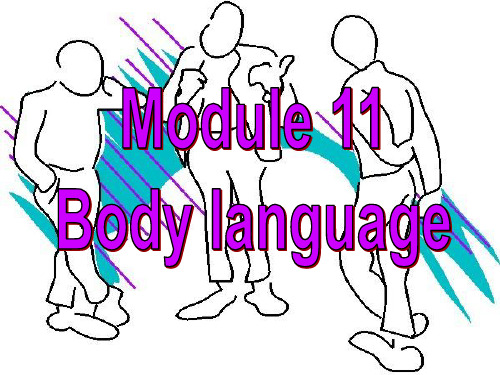
1. It’s important to be careful. Be careful.
2. It’s important to clean and tidy the lab. Clean and tidy the lab.
3. You cannot touch anything if the teacher doesn’t ask you to. Don’t touch anything if the teacher doesn’t ask you to.
2) Does body language mean the same thing in different countries? No, it doesn’t.
3) How do the Russians say hello to each other when they meet? They usually kiss three times.
用于表达叮嘱、希望、命令、请求、劝 告、警告、禁止等的句子叫做祈使句。 Come to my office,please!(请求) Be careful! (叮嘱)
Don't be late again. (劝告/警告) Don't smoke. (禁止)
归纳总结:
1. 祈使句一般没有主语,说话的对象是第二人 称“你”或“你们”,所以也可以理解为省略了主 语you。 2. 以动词原形开头,无时态和数的变化。 3. 祈使句的否定形式是在动词原形前加don't。 4. 在表达请求时,可以加上please; 表达比较强 烈的语气时,可以用感叹号。
an old man in Japan?
A. The old man. B. The young man.
外研版英语七年级下册Module 11 Body Language Unit 3 课件
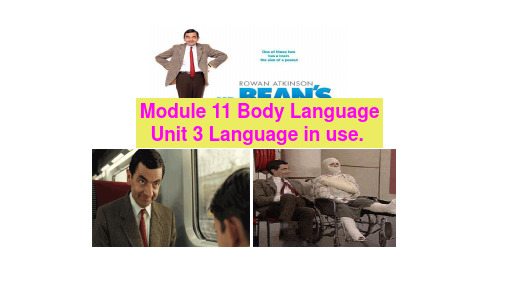
Talk about do’s and don’ts in Britain.
Stand in line.
√
Shake hands.
√
Don’t Touch people.
x
Say “please” and “thank you”.
√
Don’t Ask a woman’s age.
x
Open doors for others.
How do you express…? I’m full. Come here. Don’t do something.
It’s me. Talk about some secrets. Lose face. (丢脸)
stamp the foot
In china, usually it means _______. In the west, it means _________.
A. impatient B. angry C. happy
(不耐烦的)
In china, in means ________. In the Middle East, it is _______.
A. sorry B. rude C. comfort(安慰)
slap on the back
What does bow mean in Japan?
A. Looks
B. To look
C. Look ing
D. Look
( A)4. ________ be late for school again.
A. Don’t
B. Doesn’t
C. Do
D. Does
(B)5. ________ go and play basketball.
外研版英语七年级下 Module 11 Unit 3(共30张PPT)
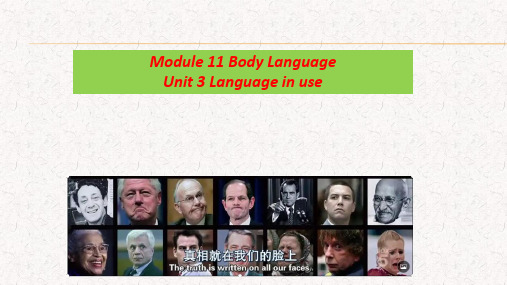
In B_r_i_t_a_i_n__,__r_e_m___e_m__b__e_r___s_o_m___e__g__o_o__d__m___a_n__n__e_rs(礼仪).
Peop_l_e__s_h__a__k_e__h__a__n_d__s__o__r__k_i_s_s__w__h__e_n___t_h_e__y__m__e_ et. Plea_s_e__s_a__y__“_p__l_e_a__s_e_”___a_n__d__“__s_o__r_r_y_”___o_f_t_e_n__.__P__lease be on ti_m__e_,__b__e_c_a__u__s_e__i_t_’s__a___w__a_y___o_f__s_h__o_w__i_n__g__r__e_spect. It's polit_e__t_o__o_p__e_n___d_o__o__r_s__f_o_r__o__t_h_e__r_s_,__b_u__t__i_t_i_s__r_u_ de to ask a woman’s age. _______________________________________________
Module 11 Body Language Unit 3 Language in use
Our body can talk. Can you tell us something from their body language?
Body language is different from culture to culture. So culture shocks(文化冲突) happen often.
Focus on paragraph writing !
Setting: A group of foreign students are coming. They are worried about their manners(礼仪) in China. Please write some advice in a paragrph to help them.
Peop_l_e__s_h__a__k_e__h__a__n_d__s__o__r__k_i_s_s__w__h__e_n___t_h_e__y__m__e_ et. Plea_s_e__s_a__y__“_p__l_e_a__s_e_”___a_n__d__“__s_o__r_r_y_”___o_f_t_e_n__.__P__lease be on ti_m__e_,__b__e_c_a__u__s_e__i_t_’s__a___w__a_y___o_f__s_h__o_w__i_n__g__r__e_spect. It's polit_e__t_o__o_p__e_n___d_o__o__r_s__f_o_r__o__t_h_e__r_s_,__b_u__t__i_t_i_s__r_u_ de to ask a woman’s age. _______________________________________________
Module 11 Body Language Unit 3 Language in use
Our body can talk. Can you tell us something from their body language?
Body language is different from culture to culture. So culture shocks(文化冲突) happen often.
Focus on paragraph writing !
Setting: A group of foreign students are coming. They are worried about their manners(礼仪) in China. Please write some advice in a paragrph to help them.
外研社七年级下册英语Module 11 Unit3 语法课件(共16张)

Homework
• 1.M11U1单词背过,并在作业本上写音标 默单词+汉意1遍,红笔批改。
• 2.把今天讲的单词用法及语法知识整理到错 题本上。
4 Answer the questions. Use the words and expressions from the box to help you.
all right arm in arm close different hold on to kiss three times point at
In Japan, people bow to say “thank you”, “sorry” ,“hello”, “goodbye”, “you’re welcome”, “excuse me”, and many other things. Children and young people bow lower when they greet older people. It’s a way of being polite and showing respect.
句) • _____ _____ school early next time, ______. • 3.Play soccer on the street.(改为否定句) • _____ _____soccer on the street. • 4.Let us go to school together.(改为反意疑问句) • Let us go to school together, _____ ______? • Let's go to school together, _____ ______?
3.祈使句的表现形式 (3)祈使句的反意疑问句
外研版英语七年级下 Module11 Unit 3 (1)(共30张PPT)
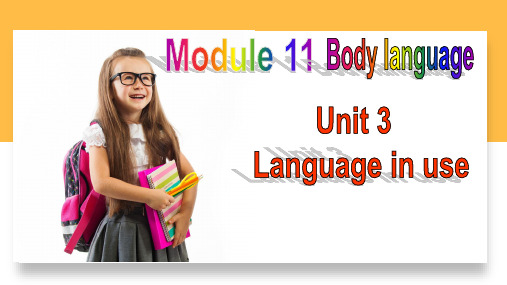
look at her
1 Facial expression
2 Posture 3 Gesture
4 other non-verbal signals
In China In America
In India
In Russia In New Zealand In _J_a_p_a_n__
Be a good boy!
Don’t be shy.
Please go upstairs!
Don’t park your car!
help me, please.
Turn left.
Walk on the zebra crossing!
Please don’t eat! Don’t let me see it! No smoking!
Don’t enter the lab alone.
Practice makes perfect.
选择:
1. ______ this kind of peach, and you will like it.
A. To try
B. Trying
C. Try
D. Tried
2.Jack, ________ to be here at 8 o’clock
Practice makes perfect.
用括号内所给动词的恰当形式填空。 1.Please ___o_p_e_n______(open) the door. 2._D__o_n_’t__b_e____(not be) careless. 3.No___t_a_lk__in_g____(talk)! 4.Please _d_o_n_’_t_w__a_tc_h__(not watch) TV so much, Jim! 5.Be ___c_a_r_e_f_u_l___(care)!
1 Facial expression
2 Posture 3 Gesture
4 other non-verbal signals
In China In America
In India
In Russia In New Zealand In _J_a_p_a_n__
Be a good boy!
Don’t be shy.
Please go upstairs!
Don’t park your car!
help me, please.
Turn left.
Walk on the zebra crossing!
Please don’t eat! Don’t let me see it! No smoking!
Don’t enter the lab alone.
Practice makes perfect.
选择:
1. ______ this kind of peach, and you will like it.
A. To try
B. Trying
C. Try
D. Tried
2.Jack, ________ to be here at 8 o’clock
Practice makes perfect.
用括号内所给动词的恰当形式填空。 1.Please ___o_p_e_n______(open) the door. 2._D__o_n_’t__b_e____(not be) careless. 3.No___t_a_lk__in_g____(talk)! 4.Please _d_o_n_’_t_w__a_tc_h__(not watch) TV so much, Jim! 5.Be ___c_a_r_e_f_u_l___(care)!
外研七年级下册第11单元Unit 3 Language in use
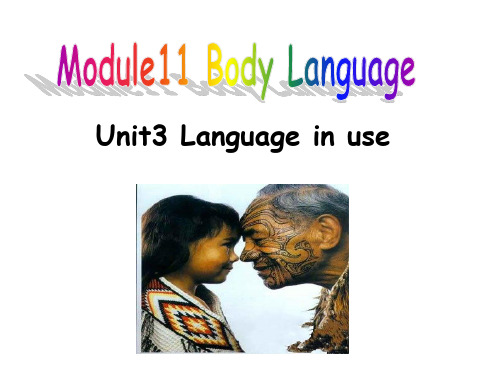
2. Don’t push.
crossing.
3. Listen to the 3. Don’t make noi2s.eB. e careful.
teacher carefully. 4. Don’t waste foo3d..Don’t play football
4. Don’t eat in class.……
• Stand in line. • Don’t touch people when you talk to them. •…
in class in the dining room on the road
1. Be quiet.
1. Line up.
1. Walk on the zebra
2. Take notes.
______.
D: In the US
People shake hands, and some kiss or _____ each other.
E: In India
People put their hands together and ____their heads.
F:
In New Zealand
A: People do different things in different countries.
B: In Russia
People usually _____ three times, left, right, left.
C: In China People often _____________ and
Britain
Do’s
• Stand in line. • Shake hands. • Say ‘please’ and ‘thank you’. • Open doors for others. • Look at people when you talk. • Be on time.
新外研版七年级英语下册Module 11 Unit 3 课件

all right arm in arm close different hold on to kiss three times point at shake hands with wave
1.How do the British say hello to each other when they first meet? They shake hands with each other. 2. Does body language mean the same thing in different countries? No , it doesn’t.
3. Rewrite the sentences.
It’s important to listen to the teacher. Listen to the teacher. You cannot shout in the classroom. Don’t shout in the classroom. 1. It’s important to be careful. 2. பைடு நூலகம்t’s important to clean and tidy the lab. 3. You cannot touch anything if the teacher doesn’t ask you to. 4. You cannot bring food or drink into the lab. 5. You cannot enter the lab alone.
11
Unit 3 Language in use
Teaching aims
1. To summarize and consolidate the use of imperative sentences 2. To be able to make suggestions using imperative sentences
外研版七年级下册英语module11unit3课件2

祈使句
祈使句是表示要求、命令或者表达意愿、建 议的句子。说话的对象(即句子的主语)通 常是第二人称,习惯上省略。谓语动词用原 形,句末用感叹号或句号,读时用降调。 (1) 肯定祈使句 :(谓语)动词原形+其它 成分 Stand up, please!
请起立! Let me have a look.
1. the long thin parts on your hand fingers
2. the part of your face which you put
food into, or which you use for
mouth
speaking
3. the part of your face that you smell with and breathe (呼吸) through
请把下面的单词连成祈使句。
1. do, it, them, let _L_e_t_t_h_e_m__d_o__it_._______________________ 2. be, late, don’t, again _D_o_n_’_t_b_e_l_a_t_e_a_g_a_i_n_. ___________________ 3. please, two, me, a, cup of, eggs, and, tea, bring P_l_e_a_s_e_b_r_i_n_g_m__e_t_w_o__e_g_g_s_a_n_d__a_c_u_p__o_f_t_e_a_. / P_l_e_a_s_e_b_r_i_n_g_m__e_a__c_u_p_o_f__te_a__a_n_d_t_w_o__e_g_g_s_.
— Don’t forget to turn off the lights when you leave. 离开时别忘记关灯。 — I won’t. 不会忘记的。
外研版 七年级英语 下册课件 Module11 unit3 Language in use (共

•
11、人总是珍惜为得到。2021/5/10 2021/ 5/1020 21/5/ 10May-2110-May-21
•
Hale Waihona Puke 12、人乱于心,不宽余请。2021/5/ 10202 1/5/10 2021/ 5/10M onday, May 10, 2021
•
13、生气是拿别人做错的事来惩罚自 己。20 21/5/ 10202 1/5/10 2021/ 5/102 021/5/ 105/1 0/202 1
即:Let + 宾语 + 动词原形 + 其它成分)。 如:Let me help you. 让我来帮你。
Task 2:(3mins)
1,翻译并观察以下句子; 2,讨论总结否定的祈使句结构如何?
别担心。
Don't worry .
别问女士年龄。
Don't ask a woman's age .
不要站得太近。
11
Unit 3 Language in use
Crazy English
Don't be afraid of losing face. Don't be afraid of making mistakes. Don't be afraid of practicing English. Don't be afraid of speaking English. Don't be afraid of being laughed at. Don't be afraid of being stared at.
“••tOLhopaoneknkadytoopouer”os.pfoler
外研版七年级下册英语module11unit3课件4

Checkthetypesofmusicthepeoplelike:
TonyLinglingBettyDamingclassical Traditional √√ Westernmusic √√
Beijingopera
pop
√
rock
反意疑问句构成:
助动词/系动词(肯定或否定)+主语(代词)?
注意:
7.What’sitcalled?
是谁的作品? 我不太清楚。 我对说唱乐很着迷。 让我清净会儿吧! 那究竟是什么? 我简直无法相信! 它叫什么?
Unit2
ViennaisthecentreofEur opeanclassicalmusic.
Drilling:
Activity2&3 (Actingoutcanbedone.)
HewasAustrian,__w_a_sn_’_th?e
Yes,hewas.
YouhaveheardofStrauss,_______ _____?
反意疑问句: 当我们陈述了一个事实,而又不是很有把握,就可以 在陈述句后加一个简短问句,称为反意疑问句。 例: 1.Youlikeclassicalmusic,don’tyou? 2.HelivedinVienna,too,didn’the? 3.Yourparentscanswim,can’tthey? 4.Tonydoesn’tlikeclassicalmusic,doesn’th e? 5.Thismusicisn’tverypopular,isit?
5.在回答反意疑问句时,要注意英汉两种语言习惯的差 别。
注意语调:
询问问题用升调,核对信息用降调。
Listenandwriteifthespeakerisaskingarealquestionorifsheisc heckinginformation. 1.You’veheardofhim,haven’tyou? 2.HewasGerman,wasn’the? 3.Youlistentopopmusic,don’tyou? Shedoesn’tlikepopmusic,doesshe? Answers:1.checkinginformation 2.askingarealquestion 3.askingarealquestion 4.checkinginformation
外研版英语七年级下册Module 11 Unit 3 Language in use 课件
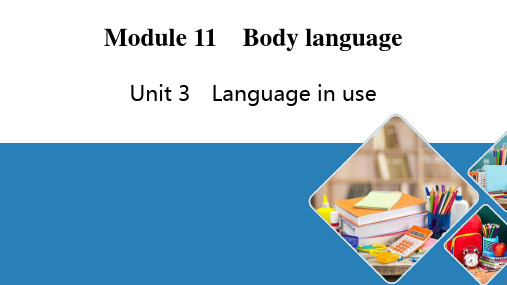
语法总结
祈使句 1.祈使句的定义:用于表达命令、请求、劝告、警告、 禁止等的句子叫作祈使句。 2.祈使句的结构: 祈使句中一般没有主语,事实上是省略了主语you。句末 用感叹号或句号,肯定结构都以动词原形开头。朗读时用降 调。
① 肯定句:以动词原形开头。有时为了表示请求或客气, 可在句首或句尾加上please。
二、按要求完成句子 1.Will you please read it again more slowly?(改为祈使句) ___R__e_a_d_i_t__ again more slowly, please. 2.If you don't listen to me, I'll go.(改为同义句) ___L_i_s_te_n__t_o___ me, or I'll go. 3.Let's watch the sports games.(改为反意疑问句) Let's watch the sports games, ____sh__a_ll_w__e__?
Go and bring your bag.去把你的书包拿来。 Look at the blackboard, please.请看黑板。 ② 否定句:在句首加Don't。 Don't take photos here.不要在这儿拍照。 Don't le+其他 Be a good boy! 要做一个好孩子! Be quick.快点。 Be quiet!安静! ④ Let型 (Let+宾语+动词原形+其他成分) Let me help you.让我来帮助你。 Let's型祈使句,其否定式为“Let's not ...”。 Let's not have a rest.咱们别休息了。
外研英语七年级下册Module11 Unit3(共28张PPT)

课堂练习答案
Language practice
Give them more personal space. Wave to say goodbye. Be careful! Don’t stand too close to North Americans.
Work in pairs. Talk about do’s and don’ts in a foreign country.
4. You cannot bring food or drink into the lab.
Don’t bring food or drink into the lab. 5. You cannot enter the lab alone.
Don’t enter the lab alone.
Around the world
5. Let Li Ming __c_le_a_n_____(clean) the blackboard! 6. It’s an important meeting. _D_o_n_’_t_b_e___ (not be) late. 7. _D__o_n_’_t _m_a_k_e__ (not make) any noise. Your mother is sleeping. 8. _D_o_n__’t_s_p_e_a_k__ (not speak) with your mouth full of food. 9. _D_o_n__’t_t_a_l_k___ (not talk) and __r_e_a_d______ (read) aloud.
Unit 3 Language in use
Let’s enjoy.
Rabbit Dance 兔子舞
Left, left, right, right , go,turn around, go, go.
外研英语七年级下册Module11Unit3(共19张PPT)

A. by bowing
B. by shaking hands
C. by kissing each other D. by touching
2. IBf oawwinogmisana wvearnytismtpoosrhtaonwt cruesstopmec(t习to惯o)tihneJrasp, an. Unlsihkee pmeoapylbeoinwmliakney_o_t_h_er_.co[ unt]ries, they greet each other bAy .bowing instead of shBa.king hands. It is impolite
YBoouwshtoupldeobpolew. to people. YDooun'ctans'tatnsdttaonodcltoosoe.close to them.
PLeooopkle alotoekaacth eoatchherot.h..er when Dthoeny'ttaslk.
DYoun'ctawna'vtewtaovseaytobysea.y goodbye.
fingDe.rsdetosucrcihbiengd.ifferent ways of bowing in Japan
1. HBoowwidngoips eaovperley igmrepeorttainntmcuasntoymc(o习un惯tr)iiensJ?a[pan.]Unlike peopAle. binymbanoywoitnhegr countries, they greBet.ebacyhsohthaekr binygbohwainngdisnstead of sCha.kbinyg khaisnsdisn. Igt ies aimcpholoittehneotrto retDur.nbaybotowutochwihnogever bows to
外研版英语课件七下Module11Unit3

4. You cannot bring food or drink into the lab.
Don’t bring food or drink intothe lab. 5. You cannot enter the lab alone.
Don’t enterthe lab alone.
4.Answer the questions. Use the words and expressions from the box to help you.
一、选择题
1. ______ this kind of peach, and you will like it.
A. To try
B. Trying
√C. Try
D. Tried
2. __________, or you’ll be late.
√A. Hurry up
B. Take it down
all right arm in arm close different hold onto kiss three times point at shake hands with wave
1.How do the British say hello to each other when they first meet? They shake hands with each other.
2. Does body language mean the same thing in different countries? No , it doesn’t.
3. How do the Russians say hello to each other when they meet? They usually kiss three times.
Don’t bring food or drink intothe lab. 5. You cannot enter the lab alone.
Don’t enterthe lab alone.
4.Answer the questions. Use the words and expressions from the box to help you.
一、选择题
1. ______ this kind of peach, and you will like it.
A. To try
B. Trying
√C. Try
D. Tried
2. __________, or you’ll be late.
√A. Hurry up
B. Take it down
all right arm in arm close different hold onto kiss three times point at shake hands with wave
1.How do the British say hello to each other when they first meet? They shake hands with each other.
2. Does body language mean the same thing in different countries? No , it doesn’t.
3. How do the Russians say hello to each other when they meet? They usually kiss three times.
相关主题
- 1、下载文档前请自行甄别文档内容的完整性,平台不提供额外的编辑、内容补充、找答案等附加服务。
- 2、"仅部分预览"的文档,不可在线预览部分如存在完整性等问题,可反馈申请退款(可完整预览的文档不适用该条件!)。
- 3、如文档侵犯您的权益,请联系客服反馈,我们会尽快为您处理(人工客服工作时间:9:00-18:30)。
8
Practice
Ⅰ.用所给单词的正确形式填空 1. Many visitors ______ (visit) came to China to see the Great Wall. Don’t forget (not forget) to close the door when you leave. 2. ___________ learning (learn) English. 3. This is the best way of ________ to say (say) goodbye when they left. 4. They waved ______ play ( play) if you don’t finish your homework. 5. You can’t ______
较强烈的语气时,可以用感叹号。
4
Work in pairs. Talk about do’s and don’ts in a foreign country. Stand in line.
Shake hands.
Do’s
Say “please” and “thank you”. Open doors for others. Look at people when you talk. Be on time.
I want to know where _____ he lives _____.
13
Homework
Finish the workbook.
14
Seeing is believing. 百闻不如一见。
15
He sits next to his mother. ————————————
11
Ⅲ.句型转换 1. Come to my room. (改为否定句) Don’t come to my room. ______ ______ 2. Why don’t you see a film on Sunday ? (改为同义句) What ______ about ______ seeing a film on Sunday? ______ 3. To learn a foreign language is important. (改为同义句) It is to_____ learn a foreign _______ _______ important __
language.
12
4. You mustn’t leave your room now. (改为祈使句)
_____ Don’t _____ leave your room now.
5. You can sing and dance. (改为否定句) can’t sing _____ or dance. You_____ 6. I want to know. Where does he live? (合并成一句)
We should wait in line when we buy things. ______________________________________
10
4. 你帮助我真是太好了。
It’s very kind of you to help me. ——————————————
5. 他靠着他的妈妈坐着。
7
4. You cannot bring food or drink into the lab.
Don’t bring food or drink into the lab. 5. You cannot enter the lab alone. Don’t enter the lab alone.
5
Touch people.
Ask a woman’s age.
Don’ts
Stand too close.
Say anything too personal.
6
Activity 3 Rewrite the sentences.
1. It’s important to be careful. Be careful. 2. It’s important to clean and tidy the lab. Clean and tidy the lab. 3. You cannot touch anything if the teacher doesn’t ask you to. Don’t touch anything if the teacher doesn’t ask you to.
Module 11 Body language
Unit 3 Language in use
1
Revision
Language practice
Give them more personal space.
Wave to say goodbye.
Be careful! Don’t stand too close to North Americans.
9
Ⅱ.翻译下列句子 1. 我的书包与他的书包不同。
My schoolbag is different from his. ———————————————
2. 我一点也不喜欢这部电影。 I don’t like this film at all. ———————————— 3. 买东西时我们应当排队。
2
祈使句的用法
1. 用来表示叮嘱、劝告、希望、禁止、请求
或命令等的句子叫祈使句。
2. 祈使句一般没有主语,说话的对象都是第 二人称“你”或“你们”,所以也可以理
解成省略了主语you。
3
祈使句的用法
3. 以动词原形开头,无时态和数的变化。
4. 祈使句的否定形式是在动词原形前加
don’t。 5. 表达请求时,可以加上please;表示比
